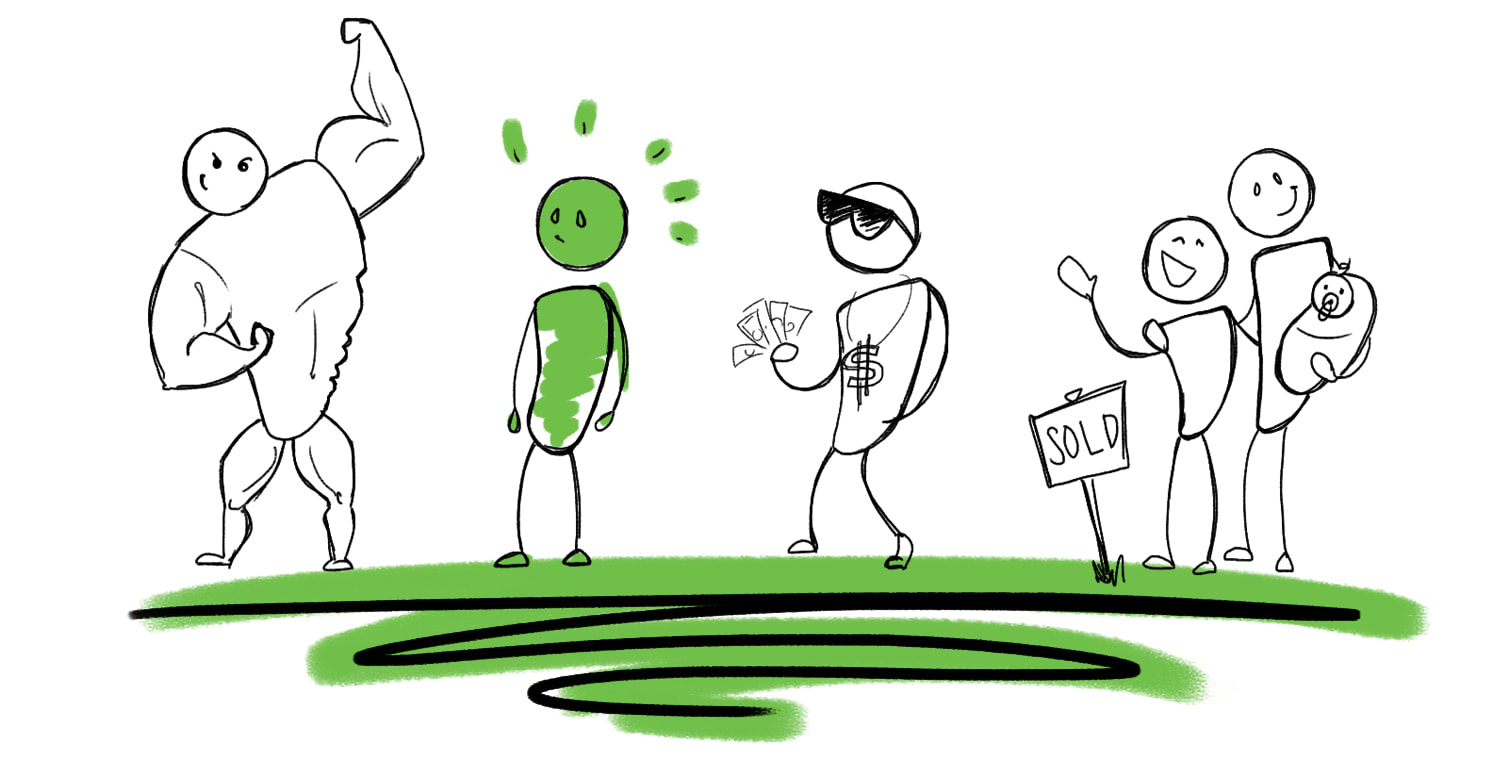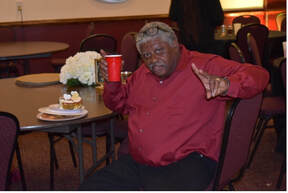A Gate Called Beautiful
Redemption Blog
What If...8/29/2021 Whenever I am anxious and worried, you comfort me and make me glad.
- Psalm 94:19 AMP I am the type of person who always jumps to the worst possible conclusion. Having that type of disposition turns everyday occurrences into cataclysmic events. If I am having a stomachache, I ask myself, what if it is cancer? If I call someone and they do not answer, I wonder, what if something is wrong? Every time I am paying for something at a store or restaurant, I am like, what if my card is declined (don’t act like you never had that fear)? To put it simply, I worry entirely too much. Are you a worrier too? Do you often find yourself playing the what if game, asking yourself: “What if I fail?”, “What if I do not get married?”, “What if I do not get the job?”, “What if I do not come up with the money”, or “what if I am sick?”. Worrying is dangerous because it affects us both physically and spiritually. If we worry too much, we risk suppressing our immune system which opens us up to sickness, disease, and possible heart failure. Worrying also affects us spiritually because when we are worrying, what we are really doing is doubting God’s ability to comfort us in times of mourning, provide for us in times of need, and do exceedingly above and beyond what we can ask of Him. Limitless And He did not do many miracles there [in Nazareth] because of their unbelief. - Matthew 13:58 AMP When Jesus returned to his hometown of Nazareth, He received a less than stellar reception. Many who heard Him, were offended by the things He was saying and authority He claimed. Because of this, He did not perform many miracles there. The people’s unbelief put a limit on what God could do in their lives. The only limits to God’s power are the ones we place on Him through our unbelief. When our worry leads to doubt, we like the people in Nazareth, place limits on a limitless God. This scripture does not say He did not perform any miracles, it says “He did not do many miracles,” which lets us know that there were some there who had the faith to believe that God can and will do what He said, and they were the ones who received the healings, breakthroughs, and blessings. Instead of worrying about the wrong things, they put their faith in the right thing. Those who were blessed in Nazareth asked a different “what if” question. They asked, “What if God is who He said He is?” And then they lived like they believed it. You are going to have to do the same thing too. Ask “What if I get the job?”, “What if my business succeeds?”, “What if I am healed?”, “What if I find the love of my life?” and “What if it all works out for my good?” Then live like you believe it. Live like something good is going to happen to and for you. Jesus tells us not to worry because our Father in Heaven knows exactly what we need (Matthew 6:32). The unbelievers in Nazareth did not have their needs met because of their unbelief - so they went on living a life of apprehension, worry, and doubt when God wanted to give them peace. Do not let unbelief keep you from getting your needs met. Eliminate worry and doubt from your life and by doing so, you will be removing the limits to what God can and will do for you.
0 Comments
The Cost of Comparison8/16/2021 Do not desire to possess anything that belongs to another person - not a house, a wife, a husband, or anything else. - Exodus 20:17 CEV
A few weeks ago, I was scrolling on social media and came across a post by Sarah Jakes Roberts that was celebrating her recent achievement of selling 100,000 copies of her latest book. Upon seeing that post I immediately started to feel bad because my book hadn’t sold 100,000 copies. Forget the fact that my goal for this year was to have 1,000 sales/downloads and to date I have nearly tripled that goal. Comparison causes us to diminish our own accomplishments. Now, you are probably thinking that it is silly of me to be comparing myself to a world-renowned minister and best-selling author and you would be correct. However, it is no sillier than when we compare ourselves to our relatives, friends, co-workers, or random people we meet and see. It has been said that comparison is the thief of joy, and when comparison leads to feelings of envy, resentment, anger, or causes you to devalue yourself then it becomes easy to see how it can rob you of your happiness, purpose, and wellbeing. What Others Have Then all the leaders of Israel met together, went to Samuel in Ramah, and said to him… “… appoint a king to rule over us, so that we will have a king, as other countries have.” - 1 Samuel 8:4-5 GNT The Israelites were God’s chosen people and yet, they were comparing themselves to others and willing to relinquish God’s protection and provision to pursue what others had. That is what comparison does to us - it makes us envy other people and things at the expense of our own peace and happiness. Even when God, through Samuel, warned them of everything they would lose by having a king they ignored him and responded by saying: “No! We want a king, so that we will be like other nations…” - 1 Samuel 8:19-20 GNT Do not ask for another person’s blessings if you don’t want their burdens. Do not ask for another person’s relationship or marriage, family, job, success, or influence because you don’t know what they had to endure to obtain those things. You were made by God, and when He made you, He put within you everything you would need to survive the trials you would face, but when you covet and pursue what someone else has you are opening yourself up to an attack that you were not made to handle. Under Valued As they danced, they sang: “Saul has slain his thousands, and David his tens of thousands. “Saul was very angry; this refrain displeased him greatly. “They have credited David with tens of thousands,” he thought, “but me with only thousands. What more can he get but the kingdom?” And from that time on Saul kept a close eye on David. - 1 Samuel 18:7-9 NIV God chose Saul to be the King of Israel until his direct disobedience led him to fall out of favor with God. Following Saul’s defiance, God then anoints David king. Saul became upset and began to compare himself with David. He grew angry because David was being credited with killing tens of thousands and him, “only thousands.” Have you, like Saul, ever undervalued your own accomplishments with an “only?” Maybe you have said things like I am only a mother, I am only an assistant, I am only part-time, I only had 10 sales, or I only have a high school education. It says, [Saul] thought, meaning - comparison caused him to create a false narrative in his head that what he had accomplished was insignificant, and an “only” led him to grow spiteful, depressed, and fearful. In the end, Saul commits suicide and that is ultimately the cost of comparison - the death of your future. Instead of comparing yourself to the image that others want you to see and creating a false narrative in your head - learn to be your authentic self and live the best life God has blessed you with to the fullest. Giving From the Bottom8/1/2021 You should each give, then, as you have decided, not with regret or out of a sense of duty; for God loves the one who gives gladly. And God is able to give you more than you need, so that you will always have all you need for yourselves and more than enough for every good cause.
– 2 Corinthians 9:7-8 GNT There are few things more important in life than giving. Those who are generous, have been found to live happier and healthier lives than those who are not. Also, generous individuals are more socially connected to their communities and inspire others to give. Giving is also biblical; God provided us with life and hope by giving us Jesus, who reminded us that, “it is better to give than receive” (Acts 20:35). Our problem is, we often conflate giving with money, but there are things (time, love, compassion, etc.) more valuable than money that you can give. One of the greatest givers I had the pleasure of knowing was my Uncle Anthony. He was not a man of great means, but that never stopped him from giving. He didn’t just give money, he gave his time, counsel, empathy, and kindness to others. When giving, he liked to say, “I know it’s not much, but it’s something.” If what you are giving comes from a place of love, then it does not matter how much it is. What you give is not as important as where you are giving it from. The Widow’s Offering As Jesus sat near the Temple treasury, he watched the people as they dropped in their money. Many rich men dropped in a lot of money; then a poor widow came along and dropped in two little copper coins, worth about a penny. He called his disciples together and said to them, “I tell you that this poor widow put more in the offering box than all the others. For the others put in what they had to spare of their riches; but she, poor as she is, put in all she had—she gave all she had to live on.” – Mark 12:41-44 GNT God is more concerned with the quality, rather than the quantity of a thing. Jesus proves this by not being moved by what the rich men were giving but instead was moved by the widow’s offering. This widow gave from the bottom – she did not have much to give but it was something and it was done with the right motives. The others gave from their wealth, but she gave from her commitment and faith. Motives When giving, always do it with the right motives. Do not give money hoping to get it back. Do not help others just to make yourself look good. Do not give your time just because you have nothing else to do. Your kind words, deeds, and gestures should come from your heart not from your ego. Commitment and Faith Giving was not unfamiliar to this woman. The fact that she was at the temple to give proves her commitment because typically when we feel like we do not have much to give, we refrain from giving. Society honors those who selfishly hold onto what they have, but God honors those who selflessly gives from the treasures that He has placed within them. That is why He tells us that if we are giving gladly, from a place of commitment and faith that what we give will be given back to us in full - pressed down, shaken together to make room for more, running over, and poured into our lap. The amount we give will determine the amount we get back (Luke 6:38). Therefore, give away what you want more of in your life. What you give should always be connected to a sacrifice. To give us life, Jesus had to sacrifice His life. So, if you want money, give money. If you want inspiration, inspire and uplift someone else. If you want love, give love. Learn to give not just what you have an abundance of, but what you want more of, and trust that God will provide for you and give you; in-return, everything you need. Brandon SuttonNew blog(s) posted monthly. Archives
December 2023
Categories |




 RSS Feed
RSS Feed
